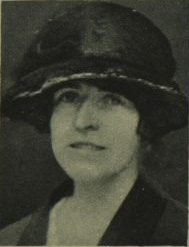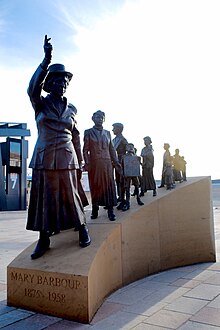Agnes Dollan
Lady Agnes Dollan MBE | |
|---|---|
 Dollan in 1924 | |
| Born | Agnes Johnston Moir 16 August 1887 |
| Died | 16 July 1966(aged 78) Glasgow Victoria Infirmary,Glasgow, Scotland |
| Nationality | British |
| Political party | Independent Labour Party Labour Party Scottish Socialist Party |
| Spouse | Patrick Dollan |
| Children | 1 |
| Parent(s) | Anne (née Wilkinson) and Henry Moir |
| Awards | Member of the Order of the British Empire(awarded 1946) |
Agnes Johnston DollanMBE(néeMoir; 16 August 1887 – 16 July 1966), also known asAgnes, Lady Dollan,was a Scottish suffragette and political activist. She was a leading campaigner during theGlasgow Rent Strikes,and a founding organiser of theWomen's Peace Crusade.In 1919, she was the first woman selected by theLabourparty to stand for election toGlasgow Town Council,and later became Lady Provost of Glasgow.[1][2]
Early life
[edit]Dollan was born on Springburn Road inSpringburn,Glasgowon 16 August 1887 to Anne Wilkinson and Henry Moir, a blacksmith in the locomotive works.[3]She was one of eleven children.[4]
Dollan attended school locally until the age of eleven before being forced to leave due to family poverty.[5]Dollan also attended theSocialist Sunday Schools,where she "graduated as a Socialist".[6]
On leaving school, Dollan went first to work in a factory before becoming aPost Officetelephone operator.[4][7]During this latter job, Dollan joined theWomen's Labour Leagueand assistedMary Reid Macarthurin creating a women's post officetrade union.[5]
Dollan joined theIndependent Labour Party(ILP) aged 18, and then theWomen's Social and Political Union.[5]
Dollan had metPatrick Dollan,a journalist and member of the Independent Labour Party, via the Clarion Scouts.[2]Dollan was married on 20 September 1912, and her only child, James, was born in 1913, and she was exempted from religious instruction at school. James Dollan also became a journalist.[8]
Rent strikes and Red Clydeside
[edit]Agnes Dollan became politically active during theRed Clydesideperiod of Glasgow's history as an organiser of the 1915 Glasgow Rent Strikes alongsideMary Barbour,Helen Crawfurd,Mary Burns LairdandMary Jeff.[9]Dollan worked to link the rent strikes movement with peace campaigns,[1]and as Treasurer of Glasgow Women's Housing Association led the campaign against rent increases imposed by landlords.[10][11]Dollan was jailed briefly in 1917 for protesting against high rents.[5]Dollan was also a member ofThe Women's Peace Crusadein Glasgow.[12]

Dollan became a prominent figure in Glasgow politics and spoke at the 1917 May Day demo inGlasgow Green.[1]
Dollan was a member of theWomen's Social and Political Unionand theWomen's Labour League.
Political career
[edit]After joining theIndependent Labour Partyaround 1915,[5]Dollan became the first female Labour candidate to stand for election toGlasgow City Councilin January 1919.[1][13]On 13 December 1921, Dollan was elected in a by-election as the councillor forSpringburn.Dollan successfully stood again for Council in 1922[14]and held the position until 1928. Dollan became aJustice of the Peacein 1928.[15]
During 1924, Dollan wrote inThe Sunday Postabout the amendment of theRepresentation of the People Act 1918,clearly linking domestic interests as a good reason for all women to have the franchise (as this Act gave the vote to certain women only).[16]
Dollan was the first Labour candidate to contestDumfriesshirein theUnited Kingdom general election of 1924,however she was unsuccessful.[17][18]
She served on theLabour Party National Executivefrom 1922 to 1928 and resumed her seat in the 1930s after a period of illness prevented her from participating in political activities. In 1933, she spoke at the National Conference of Labour Women, arguing that there should be more women candidates for the Labour Party.
I am convinced that our women are as good as the men, and better in some cases.[19]
Dollan fought against the removal of the ILP from the Labour Party, however following the split she was appointed the first president of theScottish Socialist Party's women's council in 1933.[5]Dollan campaigned to be theLabour Party (UK)candidate forLeithin the1935 United Kingdom general election.Dollan's key discussion points were the prospect of another war, the Unemployment Bill, and "poverty in the midst of plenty".[20][21]The election was ultimately contested byDavid Cleghorn Thomson.
Dollan's husband Patrick served asLord Provost of Glasgowfrom 1938 to 1941 however when she attended events with him, Agnes retained her own identity.[22]
Harry McShanewrote in his autobiography:
Pat Dollan's wife was very active and, I always thought, better than he was; I'm convinced he killed her activity..[23]
Anti-war activism
[edit]Alongside Helen Crawfurd and others, Dollan established boththe Women's Peace Crusadein 1916[2]and the Glasgow branch of theWomen's International Leaguein 1915, working withAgnes Harbenand others.[24]Both noted speakers, Dollan and Crawfurd travelled around Scotland spreading the word about the League.
She took exception to the defence of women being used as a reason for war.
With regard to the honour of women, as a woman, she objected to that being made an excuse for such a diabolical slaughter. She protested against her honour being made an excuse for war.[25]
In 1918, Dollan spoke on behalf of the ILP on 'Russian intervention' at a meeting inHamilton.[26]And in 1922, Dollan andMary Barbourspoke inLangside,discussing "the Citizenship of women and bearing on world peace, disarmament, and international justice and freedom".[27]
Dollan later modified her anti-war stance in response toWorld War II,stating that:
It was all very well to theorise under normal conditions but we were not living under such conditions today - we were facing a crisis which might mean general mobilisation.[5]
Dollan later became a member of theMoral Re-ArmamentMovement.[1]
Honours
[edit]Dollan was awarded anMBEinGeorge VI'sBirthday Honourslist of 1946 for her war efforts as the centre organiser in Glasgow for theWomen's Voluntary Services.[28]
Death
[edit]Agnes Dollan died of heart failure on 16 July 1966, aged 78, in Glasgow'sVictoria Infirmary.[8]
References
[edit]- ^abcdeEwan, Elizabeth L.; Innes, Sue; Reynolds, Sian; Pipes, Rose (8 March 2006).The Biographical Dictionary of Scottish Women.Edinburgh University Press.ISBN978-0-7486-2660-1.
- ^abcCraig, Maggie (2011).When the Clyde ran red.Edinburgh: Mainstream. p. 219.ISBN978-1-84596-735-2.
- ^"Red Clydeside: Election address of Agnes Dollan, Labour candidate for Springburn ward, page 1".gdl.cdlr.strath.ac.uk.Retrieved9 January2016.
- ^abJune Hannam; Karen Hunt (12 November 2012).Socialist Women: Britain, 1880s to 1920s.Routledge. p. 51.ISBN978-1-134-76667-3.
- ^abcdefg"Agnes Dollan".www.oxforddnb.com.Retrieved9 January2016.
- ^"A minor boadicea".The Scotsman.14 October 1924.
- ^"Phone Call That Linked Me With World Famed Murder Mystery".The Sunday Post.22 January 1939.
- ^ab"Lady Dollan: Active Socialist Worker".The Glasgow Herald.18 July 1966. p. 7.Retrieved9 January2016.
- ^Bambery, Chris (2014).A People's History of Scotland.London: Verso. p. 189.ISBN978-1-78-168284-5.
- ^Darling, Elizabeth; Whitworth, Lesley, eds. (2007).Women and the making of built space in England, 1870–1950.Aldershot [u.a.]: Ashgate. p. 116.ISBN978-0-7546-5185-7.Retrieved9 January2016.
- ^Melling, Joseph (1983).Rent Strikes: People's Struggle for Housing in West Scotland 1890-1916.
- ^"Glasgow Women and Peace".Worker's Dreadnought.20 December 1915.
- ^Dollan, Patrick (1923).History of the Kinning Park Co-operative Society Limited.
- ^"Municipal election: Many contests in Glasgow: Opposition to Labour".The Glasgow Herald.2 October 1922. p. 6.Retrieved9 January2016.
- ^"New JPs for the City of Glasgow".The Scotman.3 January 1928.
- ^"Duchess of Atholl criticised: Giving the vote to tinkers".The Sunday Post.2 March 1924.
- ^"Dumfriesshire: Party activity".The Glasgow Herald.4 May 1929. p. 5.Retrieved9 January2016.
- ^"Declarations To-Day".The Times.No. 43796. London. 30 October 1924. col 4, p. 8.
- ^"Women as candidates".Birmingham Gazette.24 March 1933.
- ^"Training courses: Unemployment Bill Proposal: Mrs Dollan's Criticism".The Scotsman.1 February 1934.
- ^"The Issue at Leith: Mrs Dollan's Socialist Message".Edinburgh Evening News.27 November 1933.
- ^"An Editorial Diary: No Lady Provost".The Glasgow Herald.25 May 1940. p. 4.Retrieved9 January2016.
- ^McShane, Harry; Smith, Joan (1978).Harry McShane: No Mean Fighter.Pluto Press. p. 34.ISBN978-0904383294.
- ^"Women's International League".Spartacus Educational.Retrieved21 January2021.
- ^"A Woman's View on the War".Glasgow Herald.30 January 1918.
- ^"Branch Reports - Hamilton".The Labour Leader.22 August 1918. p. 2.
- ^"Summer Meetings, 1922".Forward.10 June 1922.
- ^"Second Supplement to the London Gazette of Tuesday the 18th of June 1946".The London Gazette.18 June 1946.Retrieved29 March2018.
- Scottish pacifists
- 1887 births
- 1966 deaths
- Scottish Labour parliamentary candidates
- Red Clydeside
- Members of the Order of the British Empire
- People from Springburn
- Scottish suffragists
- Scottish suffragettes
- 20th-century Scottish politicians
- 20th-century Scottish women
- Women's Social and Political Union
- Scottish socialist feminists
- Pacifist feminists
- Women councillors in Glasgow
- Wives of knights
- Women's Peace Crusade
- 20th-century Scottish women politicians
